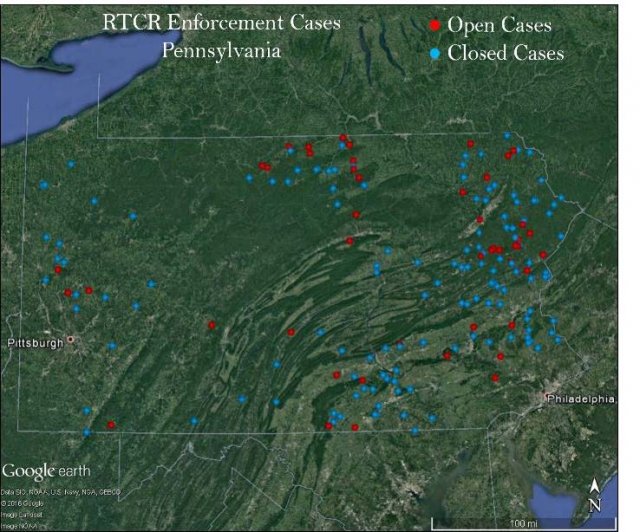EPA Team Helps Water Systems Comply with New Bacteria Monitoring Rule
Stories of Progress in Achieving Healthy Waters
U.S. EPA Region 3 Water Protection Division
Pennsylvania, Virginia • November 10, 2016
An EPA team issued nearly 200 Administrative Orders in support of Pennsylvania and Virginia to ensure that small public water systems followed new requirements for more frequent bacteria monitoring of their water supplies.
The team, led by the EPA Mid-Atlantic Region’s Water Protection Division, issued the orders in connection with EPA’s Revised Total Coliform Rule (RTCR), which became effective in April 2016. Among other provisions, the rule requires thousands of small public water systems to increase regular monitoring for bacterial contaminants from quarterly to monthly.
As of October 2016, nearly 80 percent of the water systems that were issued Administrative Orders are back in compliance. EPA is working with the Pennsylvania Department of Environmental Protection (PADEP) and the Virginia Department of Health (VDH) to address the remaining cases.
In addition to more frequent monitoring, the RTCR calls for assessments to more accurately identify issues and deficiencies in water systems that have total coliform and/or E. coli positive samples. Also, systems that operate seasonally, such as camp grounds, have new start-up procedures to ensure good water quality when they open in the spring.
In June 2016, Virginia and Pennsylvania had not yet promulgated state regulations for the new rule. Working with PADEP and VDH, EPA identified nearly 200 public water systems – all but four located in Pennsylvania – that were not in compliance with the new monitoring requirements.
EPA took the lead in enforcing the new RTCR. In addition to issuing the Administrative Orders, EPA staff made phone calls to the water systems, many of which needed assistance to understand the new requirements. Based on EPA inquiries, PADEP was able to update records for many rural public water systems, especially businesses that closed or changed names.
In one area of Pennsylvania, a local laboratory had ceased to provide microbial testing services to small systems. EPA and PADEP provided public water systems with updated lists of certified laboratories to encourage the systems to make sampling arrangements promptly. In Virginia, the limited cases were mostly characterized by the new start-up requirements for seasonal systems.
The region’s Office of Regional Counsel and Office of Enforcement, Compliance and Environmental Justice supported the Water Protection Division in the effort.

- EPA Team Helps Water Systems Comply with New Bacteria Monitoring Rule (pdf) (651.82 KB, 11/10/2016)
AT A GLANCE
-
Most systems affected by RTCR changes were very small, rural systems serving fewer than 500 customers.
-
190 Administrative Orders issued in PA, four in VA during summer 2016; 145 cases closed as of October 2016.
For additional information, contact:
Lisa Donahue
Ground Water and Enforcement Branch
U.S. Environmental Protection Agency
Region 3 Water Protection Division
1650 Arch Street
Philadelphia, PA 19103
[email protected]
